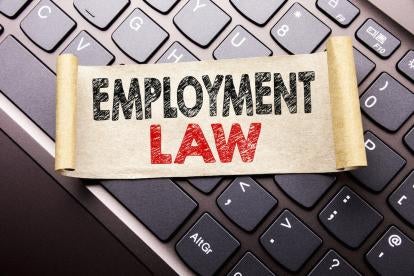This Employment Law This Week® Monthly Rundown discusses the most important developments for employers heading into July 2019. The episode includes:
1. State Legislation Heats Up
Regulatory activity is heating up around the country. Connecticut, Nevada, New Jersey, and Oregon have all passed new legislation focused on worker protections. In California and Illinois, similar bills are moving through the legislative process. But New York took the lead with a flurry of expansive new employee protection laws as its legislative session ended last month. New York passed sweeping changes to the legal standards for defining workplace harassment and defending against such claims, and broadly expanded equal pay claims. The state also passed a new statewide salary history ban and will now require employers to grant workers paid time off to vote.
“There has definitely been an uptick in legislation in New York, as well as many other states. A lot of the states have, over the past year or so, implemented a lot of laws dealing with sexual harassment, and this is sort of ‘round two’ for New York, enhancing the prior protections that really dealt with sexual harassment, and broadening them to apply to not only sexual harassment but other forms of harassment, discrimination, and also retaliation. Some of the laws apply specifically to sexual harassment, but many of these laws apply more broadly to all discrimination and retaliation and harassment claims under the human rights law. For example, these laws expand the coverage of the human rights law to all employers, not just employers with four or more employees. This change had already been made with respect to sexual harassment, but now it applies to the entire law. In addition, the law expands the protection so that it protects not only employees but other individuals, like contractors and vendors and their employees.”
Click here for more information: https://www.ebglaw.com/actnow-190627
2. NLRB Overturns Another Long-Standing Precedent
With a majority composed of the President’s nominees in place, the National Labor Relations Board (“NLRB” or “Board”) is continuing to move to undo many of the pro-union actions of the Obama era. In a recent ruling, the Board found that employers can legally ban non-employee union representatives from engaging in organizing activities at areas of their worksites open to members of the public. With this decision, the Board has once again overturned a long-standing precedent. The “public space” exception, allowing non-employee union organizers to frequent lobbies, public cafeterias, restaurants, and other spaces open to the public, had been in place since 1982. In its recent 3-1 UPMCdecision, the Board found that the employer did not violate the National Labor Relations Act when it removed non-employee organizers from the hospital’s cafeteria. This brings the NLRB in line with a number of federal courts of appeal that had disagreed with the Board.
Click here for more information
3. SCOTUS October Term 2018 Wraps Up
Justice Brett Kavanaugh’s first term is in the books, as the Supreme Court wrapped up its work last month. While Kavanaugh replaced retiring Justice Anthony Kennedy, Kennedy’s frequent swing vote was taken up this term by many different conservative justices, leading to some surprising decisions. The justices left over 20 decisions for the last few weeks, including Kisor v. Wilkie, which addressed the question of whether courts were obligated to defer to the interpretations of regulations by federal agencies charged with their enforcement and administration. In that case, the Court did not eliminate the Auer standard but held that the lower court was “too fast” in applying that standard. In Fort Bend County v. Davis, a unanimous Court held that the requirement to exhaust state remedies in a Title VII discrimination complaint is waivable, meaning that employees may be able to pursue federal discrimination lawsuits without first filing with the Equal Employment Opportunity Commission. Next term, the Court could decide whether Title VII protections extend to gay and transgender employees. That begins in October—stay tuned here for that.
4. Tip of the Week
Regina Huber, CEO of Transform Your Performance, Multicultural Transformational Leadership Coach, and D&I Consultant, shares some tips on how inclusion and trust can increase innovation in the workplace:
“We get so hung up with job descriptions, rigid expectations, and processes that we fail to uncover the best that people have to offer, that we fail to uncover people’s unique brilliance and genius. ‘Inclusion’ does not mean separating people into boxes. Inclusion is about bringing people together through dynamics that allow them to maximize each other's unique strengths and to create something bigger together. That’s what I call ‘co-creation.’ Diverse teams are only potentially more innovative. Trust is often the missing piece, so we must build trust and have those critical conversations in all directions, leading-edge conversations that allow us to turn a diverse environment into an inclusive culture. And I call this ‘humanizing’ the workplace.”
If you’d like to learn more, you can download Transform Your Performance’s white paper on their website—https://www.transformyourperformance.com/.
Stay tuned for further developments that may affect your business.





 i
i


